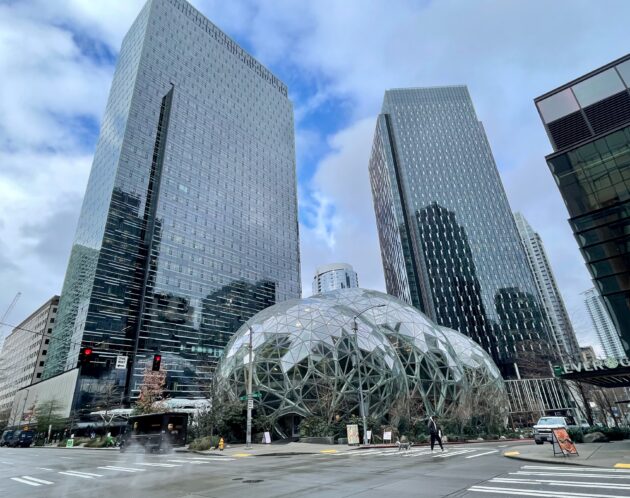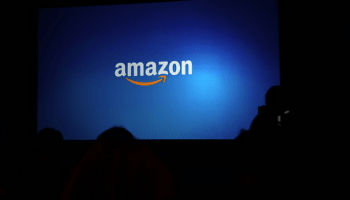
The Federal Trade Commission and 17 state attorneys general filed suit against Amazon on Tuesday, alleging that the Seattle-based tech giant is a monopoly that abuses its power.
The complaint alleges that Amazon uses “anticompetitive and unfair strategies” that “stop rivals and sellers from lowering prices, degrade quality for shoppers, overcharge sellers, stifle innovation, and prevent rivals from fairly competing” against the e-commerce giant.
The long-awaited lawsuit, filed in U.S. District Court for the Western District of Washington, is a test for FTC Chair Lina Khan and those who have targeted Amazon for years over its business practices.
“Our complaint lays out how Amazon has used a set of punitive and coercive tactics to unlawfully maintain its monopolies,” Khan said in a statement. “The complaint sets forth detailed allegations noting how Amazon is now exploiting its monopoly power to enrich itself while raising prices and degrading service for the tens of millions of American families who shop on its platform and the hundreds of thousands of businesses that rely on Amazon to reach them. Today’s lawsuit seeks to hold Amazon to account for these monopolistic practices and restore the lost promise of free and fair competition.”
Amazon issued the following statement in response to the suit, from David Zapolsky, senior vice president, Amazon Global Public Policy & General Counsel:
“Today’s suit makes clear the FTC’s focus has radically departed from its mission of protecting consumers and competition. The practices the FTC is challenging have helped to spur competition and innovation across the retail industry, and have produced greater selection, lower prices, and faster delivery speeds for Amazon customers and greater opportunity for the many businesses that sell in Amazon’s store. If the FTC gets its way, the result would be fewer products to choose from, higher prices, slower deliveries for consumers, and reduced options for small businesses—the opposite of what antitrust law is designed to do. The lawsuit filed by the FTC today is wrong on the facts and the law, and we look forward to making that case in court.”
Zapolsky penned a longer response in a separate post later Tuesday morning, in which he called the lawsuit “misguided” and said the commission has a “fundamental misunderstanding of retail.”
“The FTC pretends that this everyday retail competition doesn’t exist,” Zapolsky wrote. “But its attempt to gerrymander alleged markets into narrow subsets of retailers (who in reality compete with other retailers on the same products) can’t make Amazon into something it is not. Amazon may not be the small business it once was, but we’re still just a piece of a massive and robust retail market with numerous options for consumers and sellers.”
The FTC is joined by state partners seeking a permanent injunction in federal court that the agency says “would prohibit Amazon from engaging in its unlawful conduct and pry loose Amazon’s monopolistic control to restore competition.”
The states include: Connecticut, Delaware, Maine, Maryland, Massachusetts, Michigan, Minnesota, New Jersey, New Hampshire, New Mexico, Nevada, New York, Oklahoma, Oregon, Pennsylvania, Rhode Island, and Wisconsin.
A 2020 report from a U.S. House antitrust subcommittee previously found that Amazon “has monopoly power over most third-party sellers and many of its suppliers.”

That 450-page report concluded a 16-month investigation into Facebook, Google, Amazon and Apple as the operators of major online markets, and proposed sweeping reforms for U.S. tech giants including “structural separations to prohibit platforms from operating in lines of business that depend on or interoperate with the platform.”
Khan’s selection by President Biden as FTC chair was a big deal in 2021 because of her stance on antitrust. She gained national attention while still in law school when Yale Law Review published her article, “Amazon’s Antitrust Paradox.” In it, Khan argued that the so-called “consumer welfare standard” — in which regulators look narrowly at prices to determine whether a company has behaved monopolistically — is insufficient for the digital economy.
Khan believes that a company like Amazon can abuse its market power, even if it uses that power to lower prices for consumers, rather than raising them. Under her leadership, the FTC has taken a more aggressive stance in pursuing action against tech companies.
In June, the FTC sued Amazon for allegedly duping customers into signing up for subscriptions to its Prime service and making it unnecessarily difficult for them to cancel.



